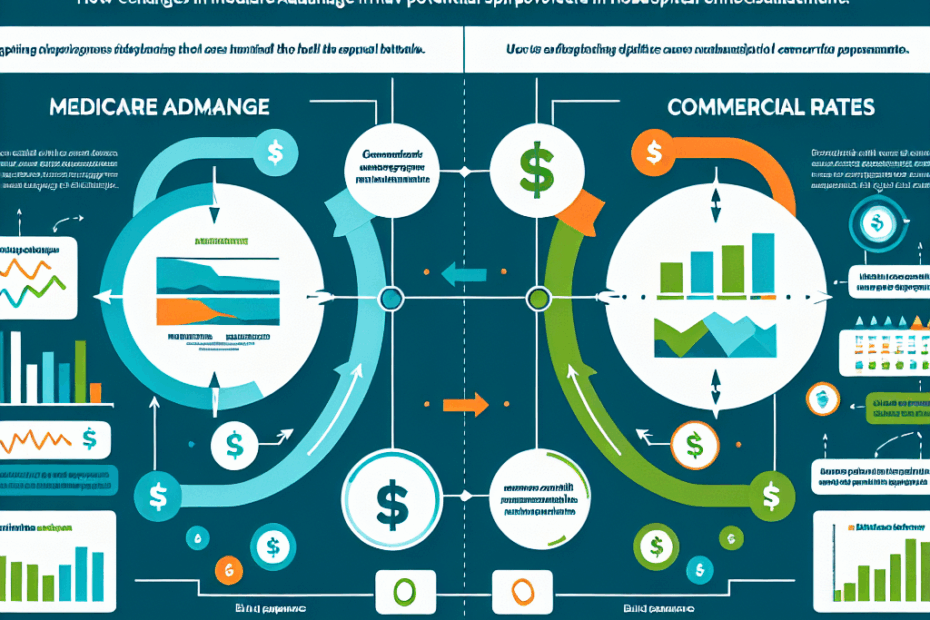“`html
Understanding How Medicare Advantage Affects Hospital Costs: A Simple Guide
Hey everyone, John here! Today, we’re diving into a topic that might sound complicated, but I’ll break it down for you: how hospitals working with Medicare Advantage plans affects the prices they charge everyone else. Let’s get started!
What’s Medicare Advantage, and Why Should We Care?
Medicare Advantage (MA) plans are offered by private companies but approved by Medicare. Think of it like this: Medicare is the original health insurance for seniors in the U.S., and Medicare Advantage is like a souped-up version offered by companies like UnitedHealthcare or Humana. These plans often have extra benefits, like vision or dental coverage.
Now, why should we care? Well, hospitals negotiate different prices with different insurance companies. What they agree to with Medicare Advantage can influence what they charge other insurance companies, and ultimately, what we pay for healthcare.
The Big Question: How Does MA Involvement Affect Hospital Pricing?
The main question we’re tackling is: If a hospital joins a Medicare Advantage network (meaning they agree to see patients with those plans), does it change the prices they charge to commercial insurance companies (the ones most of us get through our jobs)?
Lila: John, what do you mean by “commercial rates”?
That’s a great question, Lila! “Commercial rates” simply refer to the prices that hospitals negotiate with private insurance companies – the kind you and I might have through our employers. These are different from the rates set by the government for Medicare.
Possible Scenarios: Why It’s Not So Simple
The relationship between Medicare Advantage and commercial rates isn’t straightforward. There are a couple of possibilities:
- The Bargaining Power Boost: When a hospital is part of a big Medicare Advantage network, it might seem like they have less power to negotiate high prices with commercial insurers. Why? Because they’re already getting a lot of patients through the MA plan. Imagine a popular restaurant: if they are always full, they don’t need to offer discounts.
- The Spillover Effect: On the flip side, hospitals might use their experience with Medicare Advantage to become better at negotiating overall. They learn the ins and outs of dealing with insurance companies and apply that knowledge to all their contracts. Think of it like learning a new language – once you get the hang of one, learning others becomes easier!
Breaking Down the Hypotheses
The researchers in the original article (Marr et al., 2025) had some ideas about how this might work:
- Less Leverage: Hospitals deeply involved with MA plans may accept lower commercial rates, especially if the MA plan is a major player in the area. They don’t want to rock the boat.
- More Knowledge: Hospitals might learn valuable negotiation tactics from their MA contracts that they can then use to get better deals from commercial insurers.
Real-World Implications: What Does This Mean for You?
So, what does all of this mean for you and me? Well, it impacts the cost of our healthcare. If hospitals negotiate lower prices with insurance companies, those savings could (in theory) be passed on to us in the form of lower premiums or out-of-pocket costs. However, the relationship is complex, and other factors also play a role.
The Importance of Networks
It’s also important to consider the type of network we are talking about. A Medicare Advantage “preferred network” is one where the insurance company encourages you to use certain doctors and hospitals by offering lower costs.
Lila: So, it’s like the insurance company has a list of “favorite” doctors?
Exactly, Lila! It’s like the insurance company has a list of preferred providers, and they give you a better deal if you stick to that list.
John’s Perspective
It’s fascinating to see how interconnected the healthcare system is. The choices hospitals make about Medicare Advantage participation can have ripple effects that ultimately affect the prices we all pay. It highlights the importance of understanding the forces that shape healthcare costs.
Lila: Wow, it’s a lot more complicated than I thought! I always just assumed insurance companies and hospitals set prices randomly. Now I see there’s a real strategy involved.
This article is based on the following original source, summarized from the author’s perspective:
How does hospital participation in a Medicare Advantage
preferred network impact commercial reimbursement?
“`
